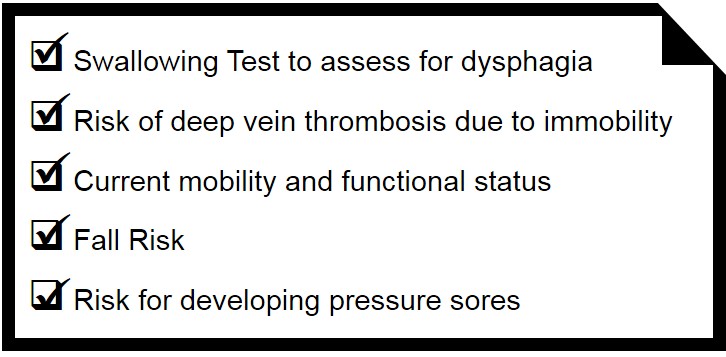Stroke Hospital Care: What to Expect
Stroke hospitalisation is usually recommended for patients who require monitoring and treatment. The Stroke Unit is a designated area in the hospital managed by a specialised, multidisciplinary stroke care team, where stroke treatment in hospital can be provided.
Stroke Care Team
The members of the stroke care team may include:
• Doctor
• Nurse
• Physiotherapist
• Occupational therapist
• Speech therapist
• Dietitian
• Pharmacist
• Medical social worker
• Neuropsychologist
Monitoring
Regular monitoring is a crucial part of care for stroke patients in the hospital. This may include periodic checks of blood pressure and assessment of the patient’s condition every few hours.
Screening
Patients will be assessed by various stroke care team members followed by an appropriate intervention or referral to any necessary healthcare professionals.

Investigation
You will undergo various tests which may include:
Brain Scan |
 | |
Ultrasound |
 | |
Heart Tests |
 |
Electrocardiogram (ECG) checks for any abnormal heart rhythm.
Echocardiogram is an ultrasound to check for the presence of any clots or abnormal communications between the chambers of your heart.
Holter monitors the heart rhythm with continuous ECG over 24 or 48 hours to detect any heart rhythm abnormalities.
|
Blood Tests |
 | |
Medication
Your doctor may prescribe medication for stroke treatment in hospital. These may be taken orally or given by injection. Do inform your stroke care team if you are taking any medication(s), over-the-counter drug(s) or traditional Chinese medications (TCM). It is best not to self-medicate before speaking to your doctor.
Early Mobilisation
Your stroke care team will encourage early mobilisation once it is safe. This is to promote smooth recovery and prevention of complications. Your safety is priority, so always ask your stroke care team for assistance if needed.
Screening and Prevention of Post-stroke Acute Complications
You will be monitored closely for any post-stroke acute complications during your hospital stay.
Planning for Rehabilitation
Your stroke care team will assess your mobility function and social situation. Rehabilitation planning will be a team-based decision together with you and your family.
Your caregiver may be required to undergo caregiver training depending on your care requirement.
Discharge Care Plan
Starting a discharge plan as soon as possible is important. If needed, the stroke hospital care team will help to organise services and make contact with key providers before you leave the hospital.
Discharge planning may include:
• Written communication to your primary care doctor at the General Practitioner/Polyclinic
• Referral to Agency of Integrated Care (AIC) to arrange for services at community hospitals, day rehabilitation centres, day care centres, home nursing, home medical programme and nursing homes
• Recommendation of medical equipment, mobility equipment and home modifications
• Coordination of outpatient medical clinic appointments after discharge
Treatments to Reduce the Risk of Another Stroke
Following stroke hospitalisation, your doctor may recommend the following strategies to reduce the risk of suffering another stroke:
Anti-Platelet Medication
E.g. Clopidogrel, Aspirin, Dipyridamole
• An anti-platelet makes the blood "less sticky" by preventing blood cells called platelets from sticking together to form a blood clot
Anticoagulant Medication
E.g. Warfarin, Novel-Oral Anti-coagulants (Rivaroxaban, Dabigatran and Apixaban)
• An anticoagulant is a blood thinner that helps prevent the formation of new blood clots and keeps existing blood clots from getting larger
• They work by interfering with the function of certain blood clotting factors
• These are usually prescribed to patients with atrial fibrillation (AF) and some other heart and blood disorders
Medication for Cholesterol Control
E.g. Simvastatin, Atorvastatin, Rosuvastatin, Ezetimibe, Fenofibrate, Gemfibrozil
• Medications that lower your cholesterol level may help to lower your risk of developing heart disease and suffering another stroke
Lifestyle Modifications
• Quit smoking
• Limit alcohol consumption
• Have a healthy and well-balanced diet
• Exercise regularly
• Maintain a healthy body weight
• Take your medications as prescribed by your doctor
• Attend medical appointments with your doctor as scheduled
Read these next:
• Stroke: How to Reduce Risk of Stroke
• Uncontrollable Risks
